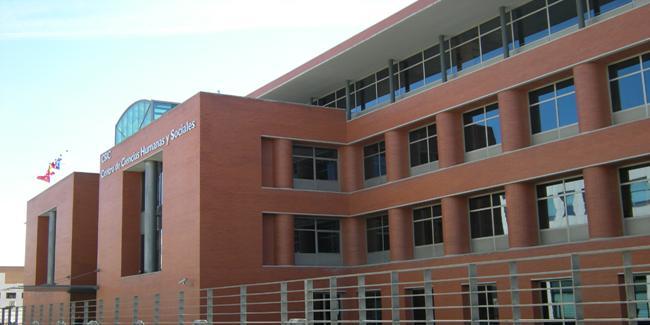
Mission and vision - about the IPP
The Institute of Public Goods and Policies (IPP) is one of the institutes of the Spanish National Research Council (CSIC) in the area of social sciences. Created in 2007, it is located in Madrid.
IPP research focuses on the analysis of some of the most pressing issues and challenges of the 21st century. The IPP team includes tenured researchers, post-doctoral researchers, PhD students and technical and support staff working together to produce knowledge that is valued by both the international scientific community and society. To this end, IPP researchers combine cutting-edge scientific knowledge from economics, political science, sociology, and science and technology studies, integrating experimental, observational and in-depth qualitative methodologies. IPP research projects are funded by competitive national R&D and EU projects, as well as research contracts and agreements with both public and private institutions.

IPP is organised in 7 thematic groups and 5 cross-cutting Research Clusters:
RC#1: Inequality and Welfare States
Inequality challenges society to its core. Entrenched socio-economic inequality reduces individual educational and occupational attainment opportunities and hinders full human development. Inequalities also impact economic growth, trust and prosocial behaviour, welfare states’ sustainability and democratic quality. Questions of how to tackle inequalities are thus top on the European political agenda, particularly in times of recurrent crises.
Cluster 1 includes the following research areas: i) new methodological ways to study the social, attitudinal and behavioural mechanisms of inequality (re)production, with an emphasis on methodological innovation; ii) the analysis of discrimination, and iii) the comparative and multi-method study of welfare governance, welfare state politics and policies, and citizens’ attitudes towards redistribution and welfare deservingness – and their respective impact on inequality.
RC#2: Sustainability
Sustainability is a major social goal and global challenge worldwide, striving to harmonise economic value creation, environmental protection and social justice. With a pronounced intergenerational dimension, sustainability is relevant across diverse production sectors, such as energy, industry, transport, agriculture and forest activities. Our research explores trade-offs among various dimensions – economic-environmental, social-environmental, and economic-social. This analysis incorporates considerations of time and technology. We aim to provide robust evidence and policy recommendations that navigate these trade-offs, mitigate conflicts, and activate synergies and complementarities.
The research of Cluster 2 encompasses i) the transition to renewable energy, ii) determinants of environmental innovation and circular economy, iii) ecosystem accounting and sustainable management of natural capital, iv) payments for ecosystem services and environmental markets, and v) climate change mitigation, spanning carbon capture and storage, carbon sequestration and emissions reduction.
RC#3: Science, Innovation and Social Change
Scientific research and innovation are crucial in long-term economic growth and development. Governments actively support them in addressing global challenges such as climate change, health, and food supply and managing the transition to new models of sustainable and resilient societies. Research to advance our knowledge on the incentives of science and innovation actors and their behaviour and interactions is necessary to deal with social and economic adaptation to current change.
The Cluster aims to better understand science and technology dynamics and their relevance for economic development and social welfare, emphasising social and spatial heterogeneity and their determinants. Special attention is given to generating rigorous bibliometric indicators, allowing for understanding the diffusion and impact of science and innovations across regions and sectors. Cluster 3 also focuses on the political, economic and social regulation of innovations in medical domains.
RC#4: Migration and Diversity
International mobility poses both great opportunities and great challenges to contemporary societies. On the one hand, immigration represents an opportunity to ageing societies, tight labour markets and deficitarian welfare states; on the other, it is also perceived as a threat to social cohesion and welfare solidarity. How do political, economic and social actors shape the governance of international mobility? How do different mobility flows shape countries’ economic, social and political institutions, and vice versa? How do stereotypes on migration shape attitudes, policies and practices of migration management and migrants’ socio-economic and political inclusion patterns? How do immigrants and their descendants integrate into their new countries of residence and what barriers do they face?
Cluster 4 investigates issues such as i) the multi-level governance of international mobility and migration policy-making; ii) the triple nexus between labour markets, welfare systems and mobility; iii) public attitudes and the politicisation of migration; iv) migrants’ patterns of socio-economic and political inclusion; v) xenophobia, racism and discrimination.
RC#5: Democracia y Resiliencia Democrática
Incumbent governments face hard choices in balancing democratic principles such as freedom and equality, environmental protection and economic growth, popular sovereignty and the rule of law. Governments often need to make these choices in a world witnessing an upsurge in the level of polarisation and growing questioning of core democratic principles.
The Cluster investigates how policymakers navigate challenging trade-offs and draw lessons from this process to enhance democratic resilience, exploring questions such as: How do traditional and innovative democratic institutions operate, and what are their most relevant outcomes? Does public opinion influence policy decisions? How do key political actors engage with institutional rules to shape policy outcomes? Why have some political systems more fruitfully integrated traditionally excluded groups such as women, immigrants or young citizens into politics than others? What are the main causes and consequences of the recent increase in political polarisation?

